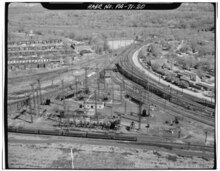Zoo Junction

Zoo Junction is an important junction on Amtrak's Northeast Corridor in Philadelphia, Pennsylvania where the Northeast Corridor meets the Keystone Corridor (ex-Pennsylvania Railroad main line).[1]
History
Zoo Junction is a flying junction, where multiple tracks cross one another by bridges to avoid conflict with other trains.[1]
In 1870 the Pennsylvania Railroad built the Connecting Railway from Frankford Junction to Zoo to bypass congested street running in Philadelphia.[2] Instead of reaching the city directly from the north, the Connecting Railway turned west, crossed the Schuylkill River on the Connecting Railway Bridge (a stone arch viaduct) and then turned south to join the PRR's Main Line at Mantua Junction. Mantua was a wye junction controlled by three manual signal boxes; there was also an engine house in the center of the wye.
By 1888 the Mantua Junction was at capacity. In 1910 the PRR built two duck-under tunnels to allow trains to reach the Connecting Railway without blocking the Main Line. In 1935 the interlocking reached its final form in conjunction with electrification and the construction of 30th Street Station and Suburban Station.
In the crescent shaped pocket between the junction and the river was the Philadelphia Zoo, which gave the interlocking its name. The former Zoological Garden station was located adjacent to the interlocking to serve visitors to the Zoo.
References
- ^ a b "Zoo tower". Signalbox.org. Retrieved 2015-11-24.
- ^ * Netzlof, Robert T. (2001-03-28). "Corporate Genealogy: The Connecting Railway". PRR Corporate History. Retrieved 2016-04-30.
